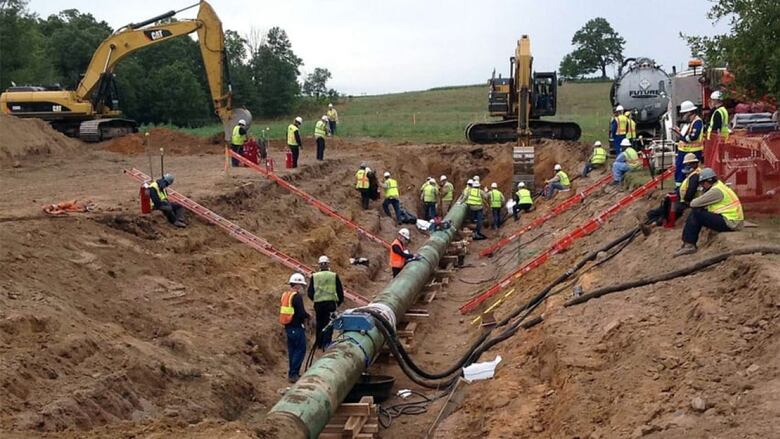Enbridge barred from restarting leaky oil pipeline
Wisconsin rupture 'absolutely unacceptable,' U.S. transport secretary says

Enbridge won't be allowed to resume oil transmission in its leaky Wisconsin pipeline until it can prove it's safe, according to a U.S. government order.
The pipeline, which carries Canadian crude oil to refineries in the Chicago area, ruptured on Friday and spilled about 1,200 barrels (190,000 litres) onto farmland, forcing the evacuation of two homes and threatening a drinking-water source four kilometres away.
"Accidents like the one in Wisconsin are absolutely unacceptable," U.S. Transportation Secretary Ray LaHood said in a statement Tuesday.
"I will soon meet with Enbridge's leadership team and they will need to demonstrate why they should be allowed to continue to operate this Wisconsin pipeline without either a significant overhaul or a complete replacement."
The U.S. Transportation Department's pipeline-safety agency issued what's called a corrective action order on Monday, in which it finds a subsidiary of Calgary-based Enbridge Inc. would risk "life, property and the environment" if it restarted the pipeline without "immediate corrective action."
The order notes that the 750-kilometre-long segment of pipe that ruptured has had problems before, notably in 2007, when 1,500 barrels of oil spilled in Atwood, Wis. Following that leak, tests by Enbridge found "multiple crack anomalies" in the piping.
"The history of failures on respondent's Lakehead Pipeline system,… defects originally discovered during construction, and the 2007 failure indicate that respondent's integrity management program may be inadequate," the order states.
Before Enbridge can resume using the pipeline to transport oil, it must submit a written plan for U.S. government approval. The company has also been ordered to conduct testing on the burst segment, reduce operating pressure in the pipeline by 20 per cent, and come up with a plan for long-term monitoring of the pipe, among other conditions.
In a statement Tuesday, the company said that "it is not unusual" for the U.S. government to issue these kinds of orders, and that it has already begun work toward satisfying several of the conditions.
Northern Gateway concerns
Enbridge, which operates one of the world's largest pipeline networks for the transmission of oil and gas, has suffered hundreds of leaks over the last decade. A 2010 rupture in Michigan spilled more than three million litres of heavy crude into the Kalamazoo River, prompting $3.7 million in fines, $800 million in cleanup costs, and a strong rebuke from the U.S. National Transportation Safety Board.
Such problems undergird critics' opposition to the company's plan to build the so-called Northern Gateway system of pipelines across northern B.C., which would ship crude from the Alberta oilsands to ports on the Pacific Ocean.
On Monday, in a fresh volley of attacks, former Canadian environment minister David Anderson said Enbridge is "the last company in North America" that should be allowed to do it because the corporation has a "cowboy culture" and pays little attention to environmental safety procedures. The Union of B.C. Indian Chiefs and the B.C. New Democratic Party have also voiced opposition to the Northern Gateway project.
Corrections
- An earlier version of this story said about 300 million litres of crude oil spilled from the Enbridge pipeline in July 2010. In fact, more than three million litres leaked from the pipeline.Aug 01, 2012 6:20 AM EDT